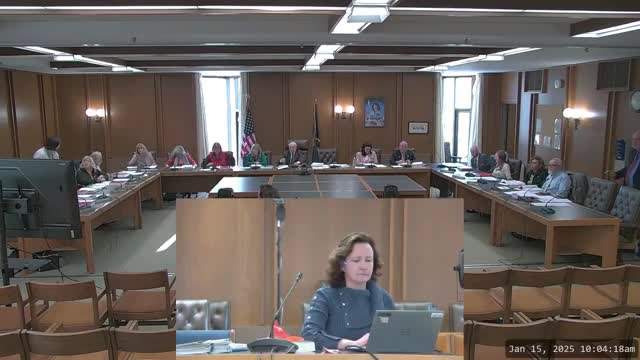Department of Education attorney walks committee through key education statutes and rulemaking limits
Get AI-powered insights, summaries, and transcripts
Subscribe
Summary
Diana Fenton of the New Hampshire Department of Education briefed the House Education Policy and Administration Committee on major education statutes, rulemaking authority, special education provisions and background-check differences between district employment and state licensure.
Diana Fenton, an attorney with the New Hampshire Department of Education, told the House Education Policy and Administration Committee that the department’s role is technical assistance, not advocacy, and that much of the state’s education law will be relevant as the committee reviews bills.
Fenton said the department “does not support or oppose any bill, but we can find information for you,” and emphasized a recurring legal distinction: “the department does not have rulemaking authority. It is the state board that has rulemaking authority.” She walked members through chapters of the Revised Statutes Annotated (RSA) that frequently arise in committee work, including RSA 21‑N (department structure), RSA 18:611 (duties of the state board), RSA 186‑C (special education), RSA 188‑E (career and technical education), RSA 189 (school administration) and RSA 194‑B (chartered public schools).
Fenton highlighted recurring points of debate. Under RSA 18:611 she drew attention to the provision on exceptions for course material and the rules covering “nonacademic surveys and questionnaires,” noting the statutory reference to the Youth Risk Behavior Survey (YRBS). She also flagged how the professional standards board (RSA 186:60) and special education statute (RSA 186‑C) often lead to technical cleanups and cross‑chapter amendments.
On background checks Fenton explained the statutory split between district employment reviews and state licensure checks: school districts do criminal-history reviews for employment (RSA 189:13a) and may consider a wider range of offenses, while the Department of Education’s credentialing process (RSA 189:13c) is limited to a statutorily listed set of disqualifying offenses (the so‑called section‑5 offenses). “If that individual has one of those section 5 violations on their record, they're not granted a license,” she said.
Fenton advised members drafting bills to be precise about rulemaking directions. She used RSA 188‑E (CTE) as an example of effective legislative language that both invokes RSA 541‑A rulemaking and prescribes the topics the board should cover. She also urged attention to effective dates in bills, noting the department regularly asks for implementation runway when laws require administrative action.
Committee chair Glenn Cordelli and members raised procedural questions about where to find laws and how to use the printed statute book and the index; Fenton offered to make her slides and technical advisories available to committee members and to help identify cross‑references for bills as they arrive.
Fenton closed by reminding members of resources: the department’s website (laws and technical advisories), the General Court website (rules and statutes) and committee services for printing and research requests. “As a practical matter,” she said, “take that proposed bill and put it into context with the chapter. Open it up and see what the bill is proposing.”
